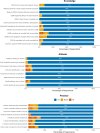Assessment of neonatologists' competency in managing gestational diabetes complications: a cross-sectional analysis from China
- PMID: 40678316
- PMCID: PMC12268886
- DOI: 10.3389/fendo.2025.1574480
Assessment of neonatologists' competency in managing gestational diabetes complications: a cross-sectional analysis from China
Abstract
Background: Gestational diabetes mellitus (GDM) significantly impacts long-term child health outcomes. This study assessed neonatologists' knowledge, attitudes, and practices (KAP) regarding GDM-related complications in offspring.
Methods: A cross-sectional study of 1,614 neonatologists in Hubei Province, China, utilized a validated 28-item questionnaire examining knowledge (12 items), attitudes (8 items), and practices (8 items). Responses were scored on a trichotomous scale. Binary logistic regression analyzed predictors of satisfactory performance across domains.
Results: Among 1,614 neonatologists, 1,437 (89%) demonstrated satisfactory knowledge, 1,513 (94%) positive attitudes, and 1,165 (72%) good practices. Knowledgeable practitioners were significantly older (45.4 vs 36.2 years; OR 1.42 [95% CI 1.40-1.44]; p<.001) with greater experience (13.8 vs 10.5 years; 1.41 [1.35-1.46]; p<.001). Academic hospital affiliation showed higher competency versus community settings (0.12 [0.08-0.20]; p<.001). Practice patterns varied by education, with MD-PhD holders demonstrating higher odds of good practice (1.32 [1.03-1.71]; P=.032) compared with fellowship training (0.69 [0.51-0.92]; p=.009). Universal documentation of maternal GDM coexisted with suboptimal rates of periodic evaluations (81%) and specialist referrals (84%). Knowledge competency (7.52 [5.90-9.60]; p<.001) and positive attitudes (15.81 [9.90-25.26]; p<.001) strongly predicted practice patterns.
Conclusions: Despite high knowledge levels and positive attitudes, particularly among experienced practitioners in academic settings, implementation gaps exist in follow-up protocols and specialist referrals. Practice setting significantly influences care delivery, suggesting the need for standardized protocols across healthcare tiers.
Keywords: China cardiomyopathy; KAP; alongside significantly; gestational diabetes mellitus; neonatology; prevalence.
Copyright © 2025 Yang and Yang.
Conflict of interest statement
The authors declare that the research was conducted in the absence of any commercial or financial relationships that could be construed as a potential conflict of interest.
Figures

References
MeSH terms
LinkOut - more resources
Full Text Sources

